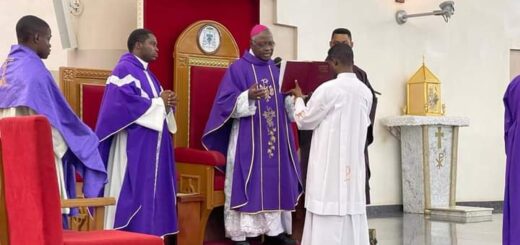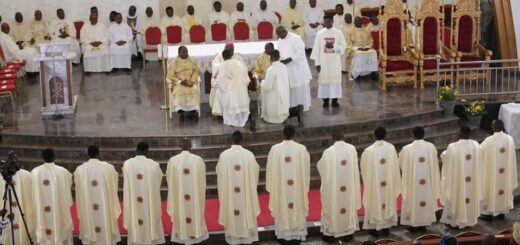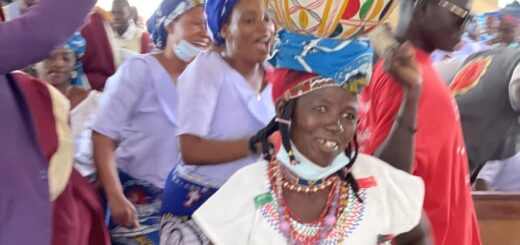KEYNOTE ADDRESS BY MOST REV. IGNATIUS A. KAIGAMA
by ARCH BISHOP · September 24, 2021
ABUJA ARCHDIOCESAN GENERAL ASSEMBLY, 24TH – 25TH SEPTEMBER, 2021. KEYNOTE ADDRESS BY MOST REV. IGNATIUS A. KAIGAMA, ARCHBISHOP OF ABUJA.
PREAMBLE
With deep gratitude to God, I heartily welcome all of you to the 2nd General Assembly of the Catholic Archdiocese of Abuja. In a special way, I welcome the representative of the Holy Father in Nigeria, His Excellency, Most Rev. Antonio Guido Fillipazzi, and the Primate of the Anglican Communion in Nigeria, Archbishop Henry Ndukuba, here represented by Venerable Andrus Ukaejiofor. I give a warm welcome to the delegates from our parishes, pastoral areas, chaplaincies, religious Congregations and Church societies. We recognize the presence of some Catholic Government officials, who are here in their capacity as members of the family of God in the Archdiocese of Abuja. I welcome those priests and religious who have been missioned to work in the Archdiocese of Abuja since our last Assembly, as well as the lay men, women and youths who have recently come to settle in Abuja, and are now part of our Archdiocesan family.
Permit me to congratulate Sr. Clare Emeruom, on her recent election as the Superior General of the Congregation of the Home Visitors of Mary.
OUR ANNUAL GENERAL ASSEMBLY AS A SYNODAL EXERCISE
The term “synodality” is more popular in Catholic vocabulary today, thanks to the Holy Father, Pope Francis. Synodality means the people of the Church “walking together”, gathering together in assemblies, and harnessing their spiritual, pastoral, intellectual and material gifts through dialogue, attentive and prayerful listening to one another.
Our theme for the General Assembly is “The Archdiocese of Abuja in Ministerial and Pastoral Collaboration”. The logo depicts Catholics coming from different parts of the country, but living and working in Abuja. They are holding hands and surrounding the Church, their mother and teacher. The Holy Spirit in the form of a dove is hovering above the entire family of God, as we strive to live out the gospel values at home (domestic church) or place of work or in the ecclesia, the assembly gathered for sharing the word of God and Eucharistic meal, to foster communion with one another and with the universal Church.
Our General Assembly is a form of synodality, where delegates from parishes, pastoral areas, chaplaincies, church societies, together with all the priests of the Archdiocese and representatives of each female and male religious Congregation working in the Archdiocese, listen to what the Holy Spirit is saying to the Archdiocese. This helps us to find a way of enhancing evangelization, and thereby, contributing to the welfare, progress and development of our Church and the nation.
THE ARCHDIOCESE OF ABUJA AS A FAMILY
The 1994 Synod on ‘The Church in Africa’ dwelt on the image of the Church as family of God, where there is care, solidarity, warmth of relations, and mutual acceptance.
In his letter to the Ephesians, St. Paul states that Christ gave some people the grace to become apostles, some prophets, some evangelists, some pastors and some teachers; gifts given “for the perfecting of the saints, for the work of ministry, and for the edifying of the body of Christ” (cf. Eph. 4:12). The Second Vatican Council expressed it clearly that “there is no member who does not have a part in the mission of the whole body….” (Presbyterorum Ordinis, 2).
Some make the mistake of believing that only the Bishops, priests and religious form the Church. This is a faulty or defective ecclesiology. To think so negates the principle of subsidiarity, division of labour, and our missionary mandate received at our baptism to share in the common priesthood of Christ. All of us together make up the Church.
There must be collaboration between the Bishops and the priests; collaboration among priests; collaboration between priests and religious; and collaboration between ordained ministers and the lay faithful. The lay faithful are not just an appendage, but active participants in the life and mission of the Church. This is based on the Pauline teaching on the Church as the body of Christ (cf. 1 Cor. 12:12-30). The body functions optimally when each part is functioning interdependently. The harmonious synergy of priests, religious and laity will create the needed unity and progress.
FORTY YEARS AFTER
Founded as Missio Sui Iuris on November 6, 1981, our ecclesiastical jurisdiction has come a long way. We are planning a celebration of the 40th anniversary on November 6, 2021, to thank God, and to discern new pastoral and spiritual strategies and initiatives to carry our Archdiocese to greater heights, with all of us being involved – children, youths, adults, catechists, and professionals such as artisans, doctors, lawyers, engineers, politicians, architects, businessmen and women, civil servants, university lecturers, economists, administrators and many others.
I commend the positive response to the creation of fifty-one pastoral areas where priests and parishioners are going the extra mile, even when in some cases; there are no church buildings, parish houses, land, etc. I renew my call to individuals or groups to sponsor either a church building or a parish house building. We have drawings and estimates of costs worked out.
SENSITIVITY TO THE YOUTH, THE POOR, AND THE NEEDY
Our missionary efforts should also consider the poor, the needy and the victims of urbanization. They may be poor in material terms, but not poor in human values, qualities and potentials. Pope Benedict XVI taught that the Church should not take on the political battle to create a more just society, replacing the State; yet, she cannot and must not remain on the sidelines in the fight for justice (Deus Caritas Est, no. 28). We cannot in Nigeria therefore remain blind to the issues of corrupt governance, unemployment, insecurity, the discontent among the young people and the increasing inability of many to meet the basic necessities of life.
Our political leaders should not feverishly dissipate energy in perfecting their costly political strategies while abandoning their social responsibilities to the people because they are targeting the 2023 elections. Only God can tell or determine what 2023 holds for Nigeria.
We continue to task the government at all levels to show greater commitment to address the worrisome state of national insecurity and raging criminal activities. The news within and outside the country about Nigeria is not too good. The huge loans we have formed the bad habit of taking, must be used to revamp the various sectors of the economy and strengthen government institutions to bring about the desired socio-economic progress, or else, we risk creating huge problems for future generations.
There must be concrete and effective measures of job creation and youth empowerment, access to social welfare services and other dividends of democracy. Many young people and professionals are grabbing every available opportunity to flee abroad for greener pastures, because their fatherland/motherland is unable to provide adequately for them.
With the Church’s limited resources, we cannot provide employment for all the youths we know, but we will continue to do what we have been doing in favour of the youth, the poor and the needy, believing that one day, the Government will truly partner with us and support us as a faith-based organization, as is done elsewhere. In addition to our scholarship scheme for indigent students, I urge the Youth Commission to dialogue with the Justice, Development and Peace Commission on how part of the proceeds of the Lenten campaign can be used for youth empowerment.
As COVID-19 is real, so are unemployment and poverty very real! We know this because we meet many people in our parishes and outstations looking up to the Church for the basic necessities of life, and the Church is not materially equipped to handle their needs.
UPDATES AND REPORTS
Our eleven commissions have been working. We hope to hear about their initiatives to contribute to pastoral progress and solidarity. There is enormous work to be done; in the areas of media evangelization, education, healthcare services, administering the sacraments, catechesis, retreats, counselling and other pastoral services. These require the cooperation of all priests, religious and the laity in a unified approach to create a significant impact that can be felt not only within the FCT city centre, but also in the periphery.
CONCLUSION
I wish to thank and commend the planning committee of this 2nd General Assembly, ably chaired by Rev. Fr. Benedict Ahamojie, for their effective preparatory and on-going work. Our thanks to the guest speaker, Very Rev. Fr. Simeon Iber, the Rector of Saint Thomas Aquinas Major Seminary, Makurdi, and all those who accepted to share with us here.
I pray that we shall return to our parishes and respective apostolates, strengthened by this fraternal gathering and more resolved to the mission of evangelization, in words and good deeds, with a renewed sense of vigour. May we experience greater spiritual, social and pastoral progress in our Archdiocese and the society at large.
Glory to Jesus, honour to Mary and Joseph!
I now have the distinguished honour and pleasure of declaring this 2nd General Assembly of the Catholic Archdiocese of Abuja open.




